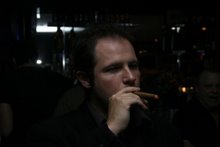Someone said to me that they couldn't even begin to understand how someone could deliberately set the Santiago fire.
I can.
There is a certain phase that I think almost all men go through sometime in their adolescence, in which destruction holds a certain fascination, in which carnage is simply cool and seems a valid end unto itself, the bigger the better. During this time a boy puts virtually no thought to the consequences of that destruction, to the danger to others or to the monetary value of things ruined. I know that I certainly went through this phase. I was a regular vandal and pyromaniac when I was in junior high school.
I'm not exactly sure where this urge, this mindset comes from but if made to play armchair psychologist, I would guess that it's a product of being that age. At twelve or thirteen years a boy is too old to be a child but nowhere near to being an adult. His physical strength and intellectual self-reliance are just beginning to come to the point where he feels he should be able to have an effect on the world but, culturally, he has virtually no outlets to do so. This desperate, unspoken need to do something of note that leads to destruction and vandalism of all sorts.
Sure, he could play on a sports team or learn a musical intrument but what will that get him, a trophy, congratulations from beaming parents? Hardly the currency of greatness. A fire or some other act of cultural nihilism arouses the attention of higher authorities, of the community, perhaps local media, certainly the police. To a young man not yet ready for manhood, that kind of attention can be deeply rewarding. It lets them know that they are not simply at the mercy of others, that they can take action and alter the landscape in which they exist and that they are, in some small way, a force with which to be reckoned.
I know what you're thinking. Tom, the Santiago fire was started by someone old enough to drive and with at least some experience in pyro-engineering. Obviously this person was an adult.
You're right. This fire, and the others like it, were set by adults, not by adolescents. I see two possibilities. These people may simply be emotionally stunted. They stopped growing as people sometime around their fourteenth birthday. Given how many guys I know that never really got over being twenty-one this seems entirely plausible, though unlikely.
The other possibility is that these people are hugely disaffected. They are angry, disappointed men, feeling powerless and perceiving themselves to have been abandoned by the world. Like so many youths, they desperately need to do something that has an effect on the world, something that gets noticed, something big, something that lets them turn on the television and say, even if only to themselves, "I did that."
I can understand that feeling. I hope that just about everyone can on some level.
I'm not excusing anyone. Whoever did this should be prosecuted and punished severely. The fact that I can empathize with these people doesn't mean that I don't think they are reprehensible, criminal, wrong, but one should also understand that there is an element of tragedy here other than the destruction and chaos wrought by the flames, themselves. Though inevitable, it's tragic that some people end up that way. If only the world were just a bit more tolerant, a touch more understanding, would this sort of thing still happen?
Who knows.
Subscribe to:
Post Comments (Atom)


1 comment:
Girls go through it too, and I'm surprised it doesn't happen more often. As I am surprised that high school shootings don't happen every day.
Post a Comment